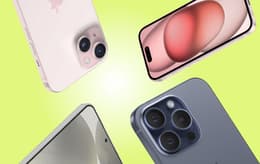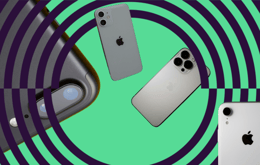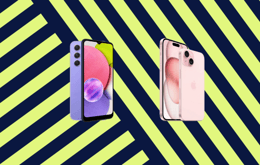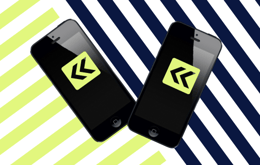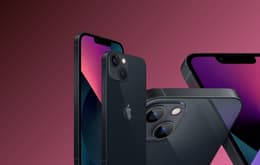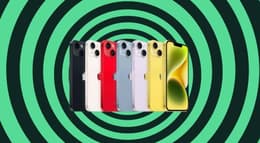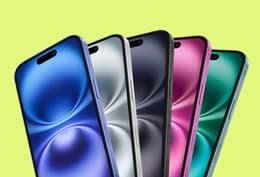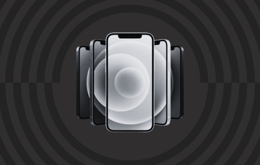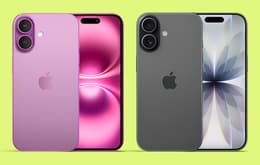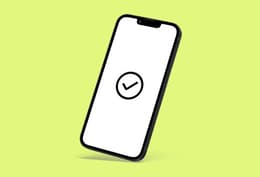
Is iPhone better than Android? Explore the iPhone or Android debate to find your perfect smartphone match.
The battle of iPhone vs Android is one of the biggest rivalries in tech, with passionate fans on both sides. Apple's iPhones are known for their sleek design, powerful ecosystem, and user-friendly iOS operating system. Android devices, on the other hand, offer a wider range of hardware options, greater customisation, and the flexibility of Google's Android operating system.
In this in-depth comparison, I'll break down the key differences between iPhone vs Android to help you decide which smartphone platform is right for you. We'll also explore the question of what's better: iPhone or Android, and if an iPhone is truly better than Android.
iPhone vs Android: Key Differences
With years of experience testing and reviewing smartphones, I have a thorough knowledge of the iPhone vs Android debate. In this article, I'll draw upon my expertise to provide a comprehensive comparison of the key differences between iPhone and Android devices, including hardware and design, user interface, price, security, and privacy, to name a few.
By examining these key aspects in detail, I aim to help readers understand the distinctions between the two platforms and to make an informed decision based on their needs and preferences.

Hardware and Design
When considering the differences between iPhone vs Android in terms of hardware and design, it's important to weigh the sleek consistency of iPhones against the diverse options available with Android.
iPhone: Sleek, premium design with limited options
iPhones are renowned for their high-end, premium feel. Apple closely controls the design process, resulting in a sleek and polished look for the iPhone. From the flagship iPhone 15 Pro Max to the compact iPhone SE, iPhones feature aluminium or stainless steel frames, glass backs, and precise construction.
However, this curated approach means there are limited iPhone models to choose from compared to Android. While beautifully crafted, iPhones don't offer as much variety in size, shape, material, and features as the Android ecosystem.
Android: Diverse range of designs and hardware options
In contrast, Android phones come in a wide array of designs and hardware configurations from numerous manufacturers, like Samsung, Google, Motorola, and OnePlus. From budget handsets to cutting-edge folding phones like the Samsung Galaxy Z Fold5, there's an Android phone to suit every preference and price point.
Many premium Android smartphones, like the Google Pixel 8 Pro, rival or surpass iPhones in terms of hardware. Android phones often boast the latest processors, higher-megapixel cameras, larger batteries, more RAM, expandable storage, and exotic new features like under-display cameras. However, the build quality and design refinement vary a lot across Android phones compared to the consistency of iPhones.
Operating Systems and User Interface
The mobile operating system and user interface are key factors in the iPhone vs Android debate, shaping the overall user experience and functionality of the devices.
iPhone: iOS is user-friendly, consistent, and regularly updated
iPhones run on Apple's iOS operating system, known for its simplicity, intuitive navigation, and consistent design across apps. iOS offers a streamlined user experience with a focus on ease of use and accessibility. The iOS home screen features a grid of app icons, widgets, and the App Library for organizing apps. iOS also provides a unified notification system, with notifications appearing on the lock screen and in the Notification Centre.
Apple maintains tight control over iOS, releasing annual updates with new features, security enhancements, and performance improvements. This ensures that iPhones receive regular software updates for several years, keeping them secure and up to date with the latest features. However, this closed ecosystem also means fewer customisation options compared to Android.
Android: Android OS is customisable, flexible, and varied across brands
Android phones run on Google's Android operating system, which is known for its flexibility, customisation options, and open-source nature. Android allows users to personalise their home screens with app icons, widgets, and launchers, offering a high degree of control over the look and feel of their devices.
However, the Android experience can vary significantly across different phone brands and models. Manufacturers like Samsung, Google, and Xiaomi often apply their own custom skins and features to Android, resulting in a less consistent user interface compared to iOS. Additionally, Android updates are often slower to roll out and may not be available on all devices, depending on the manufacturer and model.
Apps and Ecosystem
When debating iPhone vs Android in terms of apps and ecosystem, consider the trade-offs between Apple’s curated App Store experience and the more open but potentially riskier Play Store on Android devices.
iPhone: App Store is curated, secure, and well-integrated with Apple ecosystem
iPhones have access to the App Store, which offers a wide selection of high-quality iOS apps and games. Apple maintains strict guidelines and a thorough review process for apps, ensuring a curated and secure experience. The App Store is also well-integrated with other Apple services and devices, such as iMessage, FaceTime, Safari, iCloud, Apple Watch, and Apple TV.
However, this closed ecosystem can also be a limitation. Apps must adhere to Apple's guidelines and may not have access to certain system-level features. Some popular Android apps may not be available on iOS or may have limited functionality.
Android: Google Play Store has wider variety of apps, more flexibility, and integration with Google services
Android phones have access to the Google Play Store, which offers a vast selection of apps and games, including popular social media apps like TikTok and Reddit. The Play Store has a more open approach compared to the App Store, allowing developers more flexibility and access to system-level features. This can result in a wider variety of apps and more customization options.
Android apps also benefit from tight integration with Google's services, such as Google Assistant, Google Maps, and Google Drive. However, the open nature of the Play Store can also make it more vulnerable to malware and low-quality apps, requiring users to be more cautious when downloading apps from unknown sources.
Price and Value
Price is often a major factor when deciding between an iPhone or Android smartphone, with significant differences in cost and value propositions. So when comparing iPhone vs Android on price and value, consider both the upfront cost and the long-term value of each device.
iPhone: Premium prices, consistent across models
iPhones are known for their premium pricing, with flagship models like the iPhone 15 Pro Max starting at a high price point. Apple maintains consistent pricing across its iPhone lineup, with older models often receiving price drops when new iPhones are released.
While iPhones may have a higher upfront cost, they also tend to hold their value better over time compared to Android phones. iPhones are known for their longevity, with many users keeping their devices for several years before upgrading. Apple's strong brand recognition and ecosystem also contribute to the perceived value of iPhones.
Android: Wide price range, from budget to premium options
Android phones offer a much wider range of prices, from budget-friendly options under £200 to premium flagship models that rival or surpass iPhones in cost. This variety allows users to choose a device that fits their specific needs and budget.
Lower-priced Android phones often sacrifice certain features or build quality to keep costs down, while premium Android devices like the Samsung Galaxy S24 Ultra or Google Pixel 9 offer top-of-the-line specs and features. However, Android phones generally don't hold their value as well as iPhones over time, with many models seeing significant price drops within months of release.
Security and Privacy
Security and privacy are top concerns for users on both sides of the fence. While both platforms prioritise protecting user data and preventing malicious attacks, they employ different strategies to achieve these goals.
iPhone: Strong focus on security and privacy
Apple places a strong emphasis on security and privacy with its iPhones and iOS operating system. iPhones feature advanced security measures like Face ID facial recognition, Touch ID fingerprint scanning, and hardware-based encryption. Apple also employs strict app review processes to minimise the risk of malware and data breaches.
In terms of privacy, Apple has a robust set of features and policies to protect user data. iPhones include built-in safeguards like App Tracking Transparency, which allows users to control which apps can track their activity across other apps and websites. Apple also has a strong stance on not collecting or selling user data for advertising purposes, prioritising user privacy.
Android: More open system with potential for vulnerabilities
Android, being an open-source operating system, offers more flexibility but also comes with potential security risks. While Google has made significant strides in improving Android's security, the open nature of the platform and the wide range of devices and manufacturers can create vulnerabilities.
Android phones often rely on pattern locks, PINs, or fingerprint scanners for security, which may not be as secure as Apple's Face ID or Touch ID. Additionally, the Google Play Store's more open app review process can allow malicious apps to slip through, putting users at risk of malware and data theft.
However, Android does offer robust customisation options for privacy-conscious users, such as the ability to grant or deny specific permissions to apps and more control over background data usage.
Intelligent Assistants
Both smartphones come with built-in intelligent assistants to help users navigate their devices, answer questions, and perform tasks hands-free. So, when considering iPhone vs Android for intelligent assistance, weigh the seamless integration of Siri within the Apple ecosystem against the more versatile and third-party-friendly Google Assistant on Android devices.
iPhone: Siri is well-integrated with iOS, limited third-party support
iPhones feature Apple's Siri intelligent assistant, which is integrated into the iOS operating system. The system can help you with a lot of tasks, such as sending messages, answering questions, setting reminders, and of course, making phone calls. Siri also integrates well with other Apple devices and services, like the Apple Watch, Apple TV, and HomeKit smart home devices.
However, Siri's third-party app integration is more limited compared to Google Assistant. While Siri can work with some third-party apps, the range of supported apps and the depth of integration are not as extensive as Google Assistant's capabilities.
Android: Google Assistant offers powerful, wide-ranging capabilities and third-party integration
Android phones come with Google Assistant, which is widely regarded as one of the most advanced and capable intelligent assistants available. Google Assistant leverages Google's vast knowledge base and AI capabilities to provide accurate and context-aware responses to user queries.
Google Assistant excels at understanding natural language, providing personalised recommendations, and integrating with a wide range of third-party apps and services. Users can ask Google Assistant to control smart home devices, make reservations, send money, and more. Android users can access Google Assistant through voice commands, text input, or the squeeze gesture on Google Pixel phones.
Serviceability and Repairs
Serviceability and the ease of repairs are important factors to keep in mind. Accidents and wear-and-tear can necessitate repairs or part replacements, and the two platforms have different approaches to addressing these issues.
iPhone: Limited DIY repair options, reliant on Apple or authorised service providers
iPhones are known for their tight construction and lack of user-serviceable parts, making DIY repairs challenging for most users. Apple maintains strict control over the repair process, encouraging users to seek repairs through Apple Store Genius Bars or authorised service providers.
While this approach ensures high-quality repairs and genuine parts, it can also result in higher repair costs and longer wait times. Apple has recently introduced a Self Service Repair program, providing users with genuine parts, tools, and manuals for select iPhone models, but the program is still limited in scope.
Android: Easier DIY repairs, wider range of third-party repair options
Android phones, particularly those from brands like Samsung and Google Pixel, generally offer more options for DIY repairs and third-party serviceability. Many Android phones feature removable back covers and user-replaceable batteries, making it easier for users to perform basic repairs and maintenance.
The wider Android ecosystem also supports a larger network of third-party repair shops and online resources for replacement parts and repair guides. This can result in more affordable repair options and faster turnaround times compared to iPhones.
However, the repairability of Android phones can vary significantly between brands and models, with some devices featuring more complex designs or proprietary components that limit repair options.
iPhone vs Android: Pros and Cons
Having extensively reviewed both iPhones and Android devices over the years, I've come to appreciate the strengths of each platform. While both offer excellent features and capabilities, they cater to different user preferences and priorities. Let's take a closer look at the pros and cons of iPhone vs Android phones.
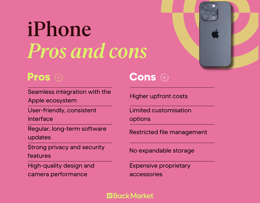
iPhone Benefits
Seamless integration with the Apple ecosystem
User-friendly, consistent interface
Regular, long-term software updates
Strong privacy and security features
High-quality design and camera performance
iPhone Drawbacks
Higher upfront costs
Limited customisation options
Restricted file management
No expandable storage
Expensive proprietary accessories
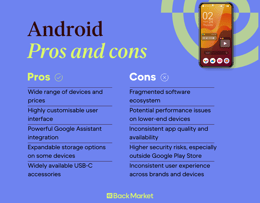
Android Advantages
Wide range of devices and prices
Highly customizable user interface
Powerful Google Assistant integration
Expandable storage options on some devices
Widely available USB-C accessories
Android Disadvantages
Fragmented software ecosystem
Potential performance issues on lower-end devices
Inconsistent app quality and availability
Higher security risks, especially outside Google Play Store
Inconsistent user experience across brands and devices
Which Should You Choose: iPhone or Android?
As a long-time iPhone user and Apple enthusiast, I've grown to appreciate the seamless integration of Apple products, from the iPhone to the iPad, Mac, and AirPods. The Apple ecosystem offers a user-friendly, secure, and unified experience that many users, including myself, find valuable. However, I also recognise that iPhones may not be the best choice for everyone.
When deciding between iPhone or Android, consider your individual needs, preferences, and budget. Think about the features and functionalities that matter most to you, such as screen size, camera quality, battery life, and whether you need access to specific apps or services.
iPhone: Best for those invested in the Apple ecosystem, prioritising simplicity and security
If you already own other Apple products like an iPad or Mac, or if you prioritise simplicity, security, and a consistent user experience, an iPhone may be the best choice for you. iPhones offer seamless integration with iCloud, iMessage, and other Apple services, as well as regular software updates and strong privacy protection.
Android: Best for those who value customisation, variety, and flexibility
On the other hand, if you value greater customisation options, a wider variety of devices at different price points, and more flexibility in terms of file management and third-party apps, an Android smartphone might be the better option. Android devices like the Google Pixel 8 Pro or Samsung Galaxy S24 offer advanced features and capabilities that cater to tech enthusiasts and power users.
Final thoughts
When shopping for a new smartphone, don't overlook the value of refurbished devices. Refurbished iPhones and Android smartphones can offer significant savings without compromising on quality or functionality. As someone who has tested numerous gadgets over the years, I've found that reputable refurbished device sellers like Back Market provide excellent value for money.
Back Market thoroughly inspects, tests, and restores each device to ensure it meets strict quality standards. By choosing a refurbished iPhone or Android phone from Back Market, you can save money while still enjoying a high-quality, fully functional device, regardless of which side you take in the iPhone vs Android debate. In addition, opting for refurbished tech is an environmentally friendly choice that helps reduce electronic waste. When you're ready to upgrade your smartphone, consider exploring the refurbished options available at Back Market.
Experience the best of both worlds by shopping for refurbished iPhones and refurbished Samsung phones on Back Market, where you'll find great deals on top-quality devices.


